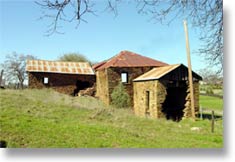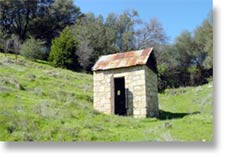                  
|

Henry
Angel, of Rhode Island, a shopkeeper who started a
trading post in the camp during the Gold Rush of
1848 has the honor of having the town of Angels
Camp named after him. As with all the extraordinary
towns along Historic Hwy 49, Angels Camp has many
stories of pioneers striking it rich. One example,
a vein of gold bearing quartz was discovered
accidentally by a man with the unique name of
Bennager Raspberry. While out hunting one afternoon
near Angels Camp, Bennager took some time to clean
his gun, and his ramrod became lodged in the
barrel. Thinking the best way to free the stuck
ramrod was to shoot the gun, he aimed the gun at a
nearby squirrel and fired, missing the squirrel and
sending the ramrod into the bushes. When he
extracted the ramrod he noticed on the tip a small
piece of quartz rich with gold. That afternoon he
dug up $700 worth of gold using only his ramrod as
a shovel. The following day, better prepared, he
pulled out $2,000 worth of gold and $7,000 on the
third day.
At one point in Angels Camp's
early history there were as many as 4,000 miners
working the claims. The Surface gold however,
quickly diminished, leaving only the hardrock
mining industry which flourished until recently.
 In
the fall of 1865 a young Mark Twain, who was at the
time living in a small cabin on "Jackass Hill",
overheard a story in a hotel bar, and later penned
the now famous "The Celebrated Jumping Frog of
Calaveras County". It was the literary piece that
made Mark Twain a household name, however, it was
not until 1928 that the Angels Camp Boosters Club
held the first celebration in honor of the first
paving of Main Street. In
the fall of 1865 a young Mark Twain, who was at the
time living in a small cabin on "Jackass Hill",
overheard a story in a hotel bar, and later penned
the now famous "The Celebrated Jumping Frog of
Calaveras County". It was the literary piece that
made Mark Twain a household name, however, it was
not until 1928 that the Angels Camp Boosters Club
held the first celebration in honor of the first
paving of Main Street.
For Thousands of years Native
Americans of the area held sacred the ancient Giant
Sequoias, located in "Calaveras Big Trees State
Park", a secret later discovered by A.T. Dowd, who
in 1850 happened across the grove. Shortly after
Dowd shared the discovery with the world, the
"Mammoth Grove Hotel" was built to allow travelers
the opportunity to stay and visit the amazing
attraction.
In 1950 the two stands of
ancient Redwoods came under the protection of the
State Park system. The park covers some six
thousand acres of forest on both sides of the
Stanislaus River, and today offers camping, hiking
and bicycling those who wish to partake of this
natural wonder.
 Calaveras
county is famous for its caverns that have been
visited and explored since 1850. Today there are
three caverns; Moaning Caverns, Mercer Caverns and
California Caverns where those with an
adventuresome spirit can be lowered into the depths
of the earth. Calaveras
county is famous for its caverns that have been
visited and explored since 1850. Today there are
three caverns; Moaning Caverns, Mercer Caverns and
California Caverns where those with an
adventuresome spirit can be lowered into the depths
of the earth.

|



 In
the fall of 1865 a young Mark Twain, who was at the
time living in a small cabin on "Jackass Hill",
overheard a story in a hotel bar, and later penned
the now famous "The Celebrated Jumping Frog of
Calaveras County". It was the literary piece that
made Mark Twain a household name, however, it was
not until 1928 that the Angels Camp Boosters Club
held the first celebration in honor of the first
paving of Main Street.
In
the fall of 1865 a young Mark Twain, who was at the
time living in a small cabin on "Jackass Hill",
overheard a story in a hotel bar, and later penned
the now famous "The Celebrated Jumping Frog of
Calaveras County". It was the literary piece that
made Mark Twain a household name, however, it was
not until 1928 that the Angels Camp Boosters Club
held the first celebration in honor of the first
paving of Main Street. Calaveras
county is famous for its caverns that have been
visited and explored since 1850. Today there are
three caverns; Moaning Caverns, Mercer Caverns and
California Caverns where those with an
adventuresome spirit can be lowered into the depths
of the earth.
Calaveras
county is famous for its caverns that have been
visited and explored since 1850. Today there are
three caverns; Moaning Caverns, Mercer Caverns and
California Caverns where those with an
adventuresome spirit can be lowered into the depths
of the earth.